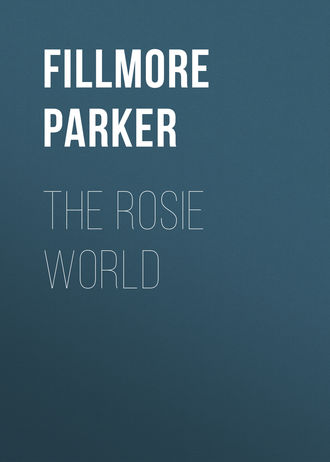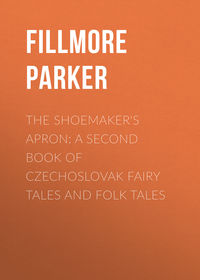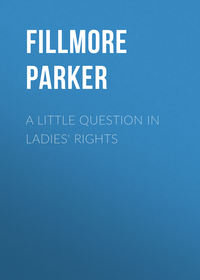 полная версия
полная версияThe Rosie World
Rosie had a mental picture of herself at that same future period, with golden hair and lovely clothes and heaps and heaps of beautiful jewels. If she could only give George a glimpse of the great contrast which in a few years there would be between her and Janet, then he'd feel sorry! He'd probably get down on his knees and beg her pardon and she, flipping back some expensive lace from her wrist, would smile at him kindly and drawl out:
"Oh, that's all right, Mr. Riley. I never think of you any more. You know how it is when a person has so many wealthy friends. I'm sorry, but I got to go now, for my automobile is waiting. Good-bye…"
But meanwhile the moonlight was still shining on the upper deck and Rosie felt perfectly sure that, by this time, Janet was tucked away in George's coat. Rosie stood the suspense as long as she could, then jumped up to investigate.
"You wait here for me, Tom," she ordered; "I'll be back in just a minute."
She hurried off to the upper deck and, of course, found conditions exactly as she knew they would be. The only thing that showed above George's coat collar was the tilted edge of Janet's old black sailor hat. Rosie stepped up quite close to the guilty pair and cleared her throat, but they heeded her not.
"All right!" Rosie warned them in her own mind. "Just keep on and you'll both be sorry some day!"
Then she told herself for the fiftieth time what a fool she had been, and she made a mighty vow never again to loan a gentleman friend to any one whomsoever.
When she got back to Tom Sullivan, Tom had a bag of peanuts which he offered her at once. "You like peanuts, don't you, Rosie? It's my last nickel, except carfare. Aw, go on, take some."
Not to seem unfriendly, Rosie accepted a handful. Crunching the shells between her fingers comforted her a little. It was the sort of treatment she would like to give some people – at any rate, it was the kind they deserved. She didn't exactly name the peanuts, but she gave them initials. To the small ones she gave the initial J, to the large ones G.
"Do you suppose those two are spoonin' up there yet?" Tom asked finally.
"What two?"
"Why, George Riley and Janet." And Tom Sullivan, who was supposed to be bashful, looked at Rosie with a meaning smile.
Rosie returned the glance with fire and daggers. "Don't you move your old chair any closer to me, Tom Sullivan!"
"Aw, now, Rosie – " Tom began, but Rosie cut him short, for the landing-bell was sounding and it was time for them to pick up their disreputable friends.
George and Janet were all for acting as if nothing unusual had happened, and Rosie scorned them afresh for the useless hypocrisy.
The journey home was stupid and unpleasant. The cars were crowded and people were ill-natured and rude and everything in general was horrid. The wind kept blowing Rosie's streamers into her eyes until she was ready to tear them off… Would they never get home?
Janet McFadden, her dull black eyes fixed in a dream, heeded nothing. But at the corner where their ways parted Rosie saw to it that she heard something. When Janet offered farewells, Rosie called out with unmistakable emphasis:
"Good-night, Tom! I've had a very pleasant time with you!"
Like Janet, George Riley seemed to think that everything was as before. He himself was quiet, with the drowsy languor that follows an evening's excitement, and he seemed to be attributing Rosie's silence to the same cause.
When they got home, Rosie tried to show him his mistake. The gas in the little hallway was burning low, and George turned it high to light Rosie upstairs.
Rosie started off without a word.
"Aren't you going to kiss me good-night, Rosie?"
At that Rosie turned slowly about and gazed down upon him with all the hauteur of an offended queen. "There's just one thing I want to tell you, Jarge Riley: because you kiss Janet McFadden, you needn't think you can kiss any girl!"
"Why, Rosie!" George began. But Rosie was already gone.
CHAPTER XIII
JANET EXPLAINS
By ten o'clock next morning Janet McFadden was at the door asking for Rosie. Rosie did not, of course, ever care to see Janet again, but as she had come Rosie could scarcely deny herself.
She found her one-time friend looking pinched and worried – conscience-stricken, no doubt – and little wonder.
"I'm going to the grocery, Janet. Do you want to come with me?"
Hardly outside the gate, Janet began: "You're not mad at me, Rosie, are you?"
"Mad?" Rosie spoke the word as if it were one with which she was unfamiliar.
"I didn't think you'd care, Rosie, honest I didn't. I thought you'd understand."
"Understand what?" There was a certain coldness in the tone of Rosie's inquiry, and Janet, feeling it, seemed ready to wring her hands in despair.
"Why, Rosie, all we talked about was you – honest it was! Jarge said you were just like his own little sister to him, and I told him I loved you more than I would my own sister if I had one."
"Huh!" Rosie grunted, recalling the tilt of Janet's black sailor hat over George's shoulder. It had looked then as if they were talking about her, hadn't it now?
"Honest, Rosie!"
"Yes, of course. I suppose now you were talking about me when you – " Rosie pursed her lips and Janet, understanding her meaning, blushed guiltily.
"Aw, now, Rosie, listen: all I wanted was to have Tom Sullivan see."
"Well, he saw all right. So did I. So did everybody. And it was disgraceful, too!"
Janet groped helplessly about for words. "I don't exactly mean on account of Tom himself."
"Oh!"
"Please, Rosie," Janet begged; "don't talk to me that way… You know Tom's mother, my Aunt Kitty. You know the way she makes fun of me because I'm ugly and lanky. She's always saying that I'm an old maid already and that I'll never get a boy to look at me. So I just wanted her to hear about a nice fella like Jarge Riley hugging me and kissing me."
Rosie looked at Janet in astonishment. She had certainly expected Janet to make up a better story than that.
"Well, I must say, Janet McFadden, this is news to me! Since when have you got so particular about what your Aunt Kitty thinks or doesn't think? I always supposed she was beneath your contemp'."
"No, no, Rosie, it isn't that! I don't care what she thinks or what she says either, if only she wouldn't go blabbing it around everywhere!" With a sudden gust of passion, Janet clenched her hands and breathed hard. "Oh, how I hate her!"
Rosie had nothing to say and, after a pause, Janet continued more quietly:
"It's this way, Rosie: You know my old man. He's all right except sometimes when he comes home not quite himself. You know what I mean."
Yes, Rosie knew. In fact, like the rest of the world, she knew a great deal more than Janet supposed about Dave McFadden's drunken abuse of his wife and child.
"He's all right when he's straight, Rosie, honest he is."
Never before had Janet confessed in words, even to Rosie, that her father wasn't always sober. It was the fiction of life that she struggled most valiantly to maintain that this same father was the best and noblest of his kind. Poor Janet! In spite of herself Rosie experienced a pang of the old pity which thought of Janet's hard life always excited. But Janet was not striving to appeal to her thus. Slowly and painfully she was forcing herself to lay bare the little tragedy that shadowed her days…
"When he comes home that way he says awful things to me. He says I got a face like a horse and arms as long as a monkey's. He'd never think of things like that if it wasn't for Aunt Kitty. You know he thinks everything Aunt Kitty says is wonderful because she's supposed to be the bright one of the family and used to be pretty. And, Rosie, she ain't got a bit o' sense. All she can do is make people laugh by making fun of somebody. She never cares how much she hurts any one's feelings. I – I know I'm ugly, but – can I help it?.." Janet's face was quivering and her eyes were swimming in tears. "I don't see why Aunt Kitty's got to talk about it, do you? Even if I am ugly, I guess – I guess I got feelings like anybody else… It's only when dad's full that he starts in on it and begins to yell around until everybody in the building hears him. And I know just as well he'd never think of it if only Aunt Kitty would let up on me a little. So I thought – Oh, you understand now, don't you, Rosie? That's the reason I did it, honest it is. You believe me, Rosie, don't you?"
Believe her? Who wouldn't believe her? Long before she had finished speaking, the citadel of Rosie's affections had been stormed and retaken and Rosie, abject and conquered, was ready to cry for mercy.
"And when I told Jarge Riley about it," Janet continued, "he was just as nice. He pretended he wanted to kiss me anyhow, but he didn't, Rosie, honest he didn't. It was only because I was your friend that he wanted to be nice to me…"
Of course, of course. At last Rosie was seeing things as they really were, and seeing them thus made her heartsick when she remembered how she had spoken to kind old George Riley. How could she ever put herself right with him?.. She would be carrying his supper up to the cars at six o'clock. There would be only an instant of time, but an instant would be enough for her to say: "Oh, Jarge, I've just been happy all day long thinking about the good time you gave me yesterday! Me and Janet have been talking about it. Thanks, thanks so much!" And George Riley, if she knew him at all, instead of recalling her foolish words of last night, would grin all over and gasp out: "Aw, Rosie, that wasn't nuthin' at all!" That was the sort of fellow George was!..
"But listen here, Rosie," Janet's voice was continuing in tones of humble entreaty; "if I'd ha' known it would ha' made you mad, I wouldn't have asked Jarge Riley – honest I wouldn't. You believe me, don't you, Rosie?"
Tears were in Rosie's throat and self-abasement in her heart. Words, however, came hard. Fortunately she could slip her arm about Janet's neck in the old sweet, intimate fashion and Janet would understand that all was well between them.
"And, Janet dear, are you sure that Tom'll tell his mother?"
"Yes, I'm sure, because I made him promise not to."
"Why, Janet!"
"Sure, Rosie. You see Aunt Kitty'll ask him all about things and he'll tell about you and how pretty you looked and about Jarge Riley, and then Aunt Kitty'll begin making fun of me and that'll make Tom mad and he'll tell Aunt Kitty not to be so sure, and then she'll see he's holding back something and she'll tease until she gets it out of him… Oh, Rosie, I tell you I know her just as well! I can just hear her! And when Tom tells her how mad you are, that'll make her believe the rest… But honestly, Rosie, I didn't know you was mad till Tom told me."
"Tom!" Rosie was indignant at once. "Do you mean to say Tom Sullivan told you I was mad? Well, the next time you see Tom Sullivan you tell him for me to mind his own business!" Rosie paused a moment, then drew Janet closer to her. "Mad? What's eating Tom Sullivan? Friends like you and me, Janet, don't get mad!"
And Janet McFadden, shaking her head in horror that any one should even suggest such a thing, declared emphatically: "Of course not!"
CHAPTER XI
VON SCARS AND BRUISES
A few mornings later Rosie was seated on the front steps, shelling peas, when Janet passed the gate.
"Aren't you coming in?" Rosie called out.
At first Janet was not, but on Rosie's second invitation she changed her mind. As she reached the steps, Rosie discovered the reason of her hesitation. She had a black eye. She carried it consciously, but with such dignity, as it were, that Rosie could not at once decide whether Janet expected her to speak of it, or to accept it without comment.
Janet herself, after an introductory remark about the weather, broached the subject.
"What do you think about the eye I've got on me? Ain't it a beaut?"
It certainly was, and Rosie expressed emphatic appreciation.
"And how do you suppose I got it?" Janet pursued.
"I couldn't guess if I had to!"
Rosie's answer was tactful, rather than truthful. In her own mind she had very little doubt whence the black eye had come. But it would never do to say that she supposed it had been given Janet by her father during one of the drunken rages to which he was subject. With one's dearest friend one may be frank almost to brutality, but not on the subject of that friend's family. There are reserves that even friendship may not penetrate. So, with an exaggeration of guilelessness, Rosie declared:
"I couldn't guess if I had to! Honest I couldn't!"
Janet had her story ready:
"You know how dark the halls in our building are. Well, I was just going downstairs, when a boy sneaked up behind me, and pushed me, and I slipped, and hit my face against the banister. And I think I know who it was, too!"
Rosie was by nature too simple and direct to simulate with any great success the kind of surprise that Janet was forever demanding of her. Fortunately this time it did not matter, for, while Janet was speaking, Rosie's mother had appeared with an armful of darning. Unlike Rosie, Mrs. O'Brien was always in a state of what might be termed chronic surprise. She paused now before seating herself, to remark in shocked tones:
"Why, Janet McFadden, what's this ye're tellin'? Mercy on us, ain't b'ys just awful sometimes! But I'm thinkin' your da'll soon settle that lad!"
Janet shook her head violently.
"Mrs. O'Brien, I wouldn't dare tell my father that boy's name for anything! My father'd just murder him – honest he would! It just makes my father crazy when anybody touches me! He ain't responsible, he gets so mad – really he ain't! So you can see yourself I got to be mighty careful what I tell him. Besides, I ain't dead sure it was that boy, but I think it was."
Mrs. O'Brien's interest in the situation equalled Janet's own.
"I see exactly the place you're in, Janet, and I must say it's wise, the stand you take."
Mrs. O'Brien bit off a strand of darning cotton, and carefully stiffened the end.
"You see," Janet continued, "it's this way with me. I'm an only child, and you know yourself how men act about their only child."
"I do, indeed, Janet, and I feel for you." From her sympathetic understanding of Janet's problem, one would never have supposed that Mrs. O'Brien herself was the mother of a large family, and had been the child of a larger one. She held up a sock impressively. "You're quite right, Janet. Your da might do somethin' awful. There's no holdin' back some men when they take it into their heads that their only child has been mistreated."
Rosie sighed inwardly. She had very little of that histrionic sense that prompts people to assume a part and play it out in all seriousness. At first such a performance as the present one wearied her. Why in the world do people pretend a thing when they know perfectly well that they are pretending? Then, as the moments passed, she grew interested in spite of herself, for the acting of her mother and Janet was most convincing. At last she was not quite sure that it was acting. She was brought back to her senses by Janet's turning suddenly to her with the exclamation:
"Ain't they all o' them just awful, anyhow!"
No need to ask Janet of whom she was speaking. It was an old practice of hers, this glorifying her father in one breath, and in the next vilifying men in general. Rosie protested at once:
"Why are they awful? I think they're nice."
Janet looked at her in kindly commiseration.
"Well, then, Rosie, all I got to say is – you don't know 'em."
"I don't know them! Well, I like that!" Rosie was indignant now. "I guess I know them as well as you do!" Rosie paused, then concluded in triumph: "Don't I know my own brother Terry? I guess he's all right!"
"Terry," Janet repeated, with a significant headshake. "Now I suppose, Rosie, you think you and Terry are great friends, don't you?"
"I don't think so; I know so."
Janet laughed cynically.
"Yes, I suppose you and him are great friends as long as you run your legs off for him. But listen to me, Rosie O'Brien! Do you know what he'd do to you if you was to lose one of his paper customers? He'd beat the very puddin' out of you! I guess I know!"
"Janet, you're crazy!"
"Crazy? All right, Rosie, have it your own way. But I leave it to Mis' O'Brien if I ain't right."
That lady, being, as it were, pledged to Janet's support, instead of vindicating her own son, made the weak admission:
"Well, I must confess there's somethin' in what Janet says."
At Janet's departure, Rosie looked at her mother scornfully.
"Ma, don't you really know how Janet got that black eye?"
Mrs. O'Brien dropped her darning in surprise. At every turn life seemed to hold a fresh surprise for Mrs. O'Brien.
"Why, Rosie! What a question to ask your poor ma! Do I look like I was born yesterday?"
Mrs. O'Brien did not; but, even so, Rosie insisted upon a direct answer.
"Well, then, if you really must know, Rosie dear, I'll be glad to tell you. That brute of a Dave McFadden has been knockin' her down again."
Rosie clucked her tongue impatiently. "Maggie O'Brien, there's one thing I'd like to ask you. When Janet knew how she got that black eye, and you knew how she got it, and she knew perfectly well that you knew, why in the world did you both go pretending something else?"
Mrs. O'Brien looked at her daughter in patient despair.
"My, my, Rosie, what a child ye do be! Wouldn't it be awful of me to go insultin' poor little Janet by saying: 'Ho, ho, Janet, that's a fine black eye yir da has given you!'"
Rosie squirmed in exasperation. "But why do you got to say anything? Why do either of you got to say anything?"
"Why do I got to say anything?" In Mrs. O'Brien, surprise had now turned to amazement. "Why, Rosie dear, what's this ye're askin' me? Haven't I always got to say somethin'? Wasn't it for talkin' purposes that the Lord put a tongue in me head?"
"But couldn't you talk about something else besides that black eye?"
"I could not. Take me word for it, Rosie, that black eye was the one thing of all to talk about. Don't you see, dear, 'twas that was taking up Janet's entire attention, for it was on her mind as well as on her face. So not to make it awkward for the poor child, I simply had to talk and let her talk."
Rosie still shook her head obstinately. "Even if it was on her mind, I don't see why she had to go make up that silly story that nobody believes, and that she don't believe herself. She always does."
Mrs. O'Brien's face broke into a smile of understanding.
"Ah, Rosie, I see now what's troublin' you. You don't see why poor Janet wants to cover up that brute of a Dave."
This was exactly what was troubling Rosie, as she agreed readily enough.
"And, Ma," she continued, "do you suppose if my father beat me, I'd go around pretending he was the best ever? Well, I wouldn't!"
"Your poor da, did you say, Rosie? May God forgive you for havin' such a thought! Why, that poor lamb wouldn't hurt a fly – he's that gentle! Ah, Rosie, it's on yir knees ye ought to be every night of yir life, thankin' God for the kind o' father I picked out for you!"
"I am thankful, but I wouldn't be if he was like Dave McFadden. And I wouldn't pretend I was, either."
"Ah, it's little ye know about that, Rosie, for just let me tell ye – ye'd be exactly like Janet if ye were in Janet's shoes."
"I bet I wouldn't!"
"Rosie, ye couldn't help yirself. Ye'd have to stand up for him even if he was a brute."
"Why would I have to?"
"Because he's your da. Is it possible, Rosie dear, that ye don't yet know 'tis a woman's first duty to stand up for a man if he's her da, or her brother, or her husband, or her son? Mercy on us, where would we be if she didn't? Have ye ever heard me, all the years of your life, breathe a whisper against Jamie O'Brien?"
"I should think not!" To Rosie this seemed a very poor example of the principle in question. "How could you? Dad never even beats the boys, let alone you and me!"
Mrs. O'Brien smacked her lips pensively. "No, he don't beat me." She sighed slowly. "I mean now he don't."
Rosie looked at her mother with startled eyes. "Ma, what do you mean?"
Mrs. O'Brien sighed again, and took up her darning. "Nuthin' at all, Rosie. I don't know what I'm sayin'. I can't gab another minute, for I must finish this sock. So run off, like a good child, and don't bother me."
"But, Ma" – Rosie's voice dropped to a whisper, and a look of horror came into her face – "do you mean he used to – beat you?"
"Rosie dear, stop pesterin' me with your questions. Far be it from me to set child against father, and, besides, as you know yourself, he's behavin' now. What's past is past. I've said this much to you, Rosie, so's to give you a hint of the ragin' lions that these here quiet, soft-spoken little lambs of men keep caged up inside o' them. Oh, I tell you, Rosie dear, beware o' that kind of a man, for you never know when the lion in him is goin' to break loose and leap out upon you. Ah, I know what I'm sayin' to me everlastin' sorrow!"
"Why, Ma, are you crazy! Dad has never laid a finger on you, or on any one else, and you know he hasn't!"
Rosie scanned her mother's face in hope of discovering a little family joke, but Mrs. O'Brien met her gaze with sad, truthful eyes as guileless as a baby's.
"All right, Rosie dear, maybe your poor ma is crazy. But I wonder now ye've never noticed the scar on me right shoulder, nor asked the cause of it."
"What scar?"
"Have you never seen it, Rosie?"
Mrs. O'Brien began unbuttoning her waist to exhibit the scarred shoulder. Then she paused, thought a moment, and changed her mind.
"No. As ye've never noticed it, Rosie, it wouldn't be right of me to show it to you now. The sight of it might make you bitter. But you surprise me that you've never seen it. It's a foot long at least, and two fingers deep, and itches in rainy weather."
"Why, Ma!" Rose's eyes were fixed, and her mouth a round, blank question mark.
"Upon me word of honour, Rosie!"
For a moment Rosie was too shocked to go on. Then she gasped: "How – how did it happen?"
"How did it happen, do you ask? That, Rosie, is a secret that'll go with me to the grave. This much I'll tell you – 'twas made with a butcher-knife. But who gave the blow, I wouldn't confess under torture. Now, Rosie dear, don't tempt me to say another word, for I'm done."
Mrs. O'Brien lifted her head high, took a long breath, and began a serious attack on the sock.
Rosie questioned further, but in vain.
CHAPTER XV
THE BRUTE AT BAY
Her own father!.. All afternoon as she went about delivering papers, Rosie's mind kept going over this amazing revelation. Not for an instant did she question the truth of it. An exuberance of imagination very often led her mother to embroider fancifully the details of a story, but surely not this time. This time that scar, that awful scar, was evidence enough of what had taken place.
To think that Rosie had never even suspected that side of her father's nature! She shuddered at her own innocence. To her, her father had always seemed all gentleness and meekness. Gentleness and meekness, indeed! Why, with that raging lion ramping and tearing about inside of him he was little better than a wolf in sheep's clothing!
At first Rosie dreaded ever seeing him again. She doubted whether, at sight of him, she could conceal sufficiently the abhorrence that she felt. Then she began to want to see him, as one wants to see the animals in the carnivora building at feeding time. It is a racking experience, but one likes to go through it. Rosie's final decision was to take one look at the beast, hear for herself the sound of its roar, then flee it forever.
A good time to see Jamie O'Brien was after supper, in the cool of the evening, when he slipped off his shoes, unloosened his suspenders, and sat him down in the peace and quiet of the back yard. He had a broken-down old arm-chair, which he knew how to prop against the ancient little apple-tree and support with a brick at its shortest leg. For one-half hour every summer evening, when the old chair was properly braced, and his sock feet were stretched out at ease on a soap-box, Jamie O'Brien knew comfort, utter and absolute. It was the moment when, like old King Cole, he called for his pipe.






